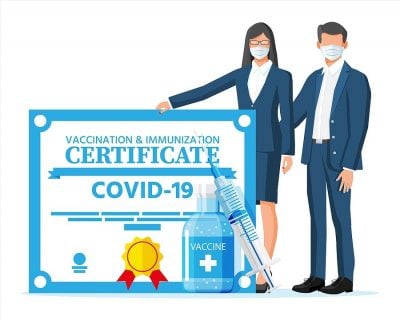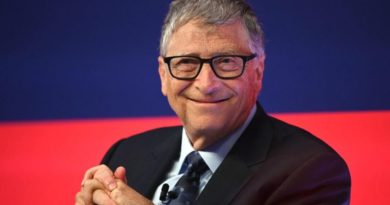Are American Businesses Committing Suicide by Mandating COVID-19 Vaccines for Their Employees as Staffing Shortages Increase?

While the public continues to debate COVID-19 Vaccination “Passports” or IDs in order to participate in society, many businesses have recently announced that they are planning to mandate the shots as a condition for employment.
It is a growing list, and currently includes companies such as:
- Microsoft
- Walmart
- Saks Fifth Avenue
- Walt Disney Co.
- Netflix
- BlackRock
- Vanguard
- Morgan Stanley
- Goldman Sachs
- Uber
- Lyft
- DoorDash
- Ford
- Tyson Foods
- United Airlines
- The New York Times
- The Washington Post
and scores of others, including many restaurants and gyms, and most of the medical industry.
This begs the question: Are these companies committing financial suicide by further restricting the labor force that is already seeing massive shortages since last year?
I think the answer is most definitely, YES.
One industry that has obviously seen explosive growth since the Plandemic started is the pharmaceutical industry which has received TRILLIONS of dollars to develop COVID-19 “vaccines.”
But according to a report today published in FiercePharma, the marketing trade publication for the industry, what is holding back future growth in the industry are staffing shortages.
Raw materials and limits on high-tech equipment often take center stage when it comes to discussions around manufacturing bottlenecks. But the COVID-19 pandemic has exposed another weak link in the pharmaceutical supply chain: people.
As COVID-19 vaccine production moves full-tilt, mRNA players Pfizer and Moderna are having trouble recruiting talent in Massachusetts, The Boston Globe first reported, citing comments by company execs at a hearing of the Massachusetts Legislative Manufacturing Caucus last week.
Hiring challenges, which have been exacerbated by the pandemic, aren’t unique to COVID-19 vaccine makers. They’re not confined to the Bay State either, biopharma executives have warned.
The problem has surfaced in other industry hot spots like Bothell, Washington, and it’s emerged as a pain point in the fast-growing cell and gene therapy field, for example.
Meanwhile, 68% of organizations surveyed during the pandemic flagged finding and attracting quality workers as their biggest recruitment challenge, workforce resources company AMS said earlier this year.
Moderna earlier this year blamed vaccine delays in countries like the U.K. and Canada on “limited human and material resources” in its European supply chain. At a summit on COVID-19 vaccine scale-up the next week, the biotech’s CEO Stéphane Bancel put it more bluntly when he said, “the bottleneck right now is people.”
Much of Moderna’s production work is concentrated in the U.S., but the company’s European supply chain depends on Swiss CDMO Lonza, which had struggled to fill out its roster for the pandemic undertaking, the CEO said at the time.
While COVID-19 production timelines have put many companies through the wringer, vaccine players aren’t the only ones struggling to staff up in the pandemic’s second year.
“We’re definitely seeing a slowdown in responses to roles that we’re posting, roles that in previous years you would have had a real big pile of resumes,” Cory Siddons, senior director of manufacturing at Alnylam, said at last week’s hearing. The problem isn’t unique to manufacturing technician jobs, Siddons added.
Part of the problem stems from the fact that each new employee needs to be trained on specific manufacturing practices and standards for their role, which can take months at minimum, Andrea Wagner, Ph.D., chief technical officer at Berkshire Sterile Manufacturing, added.
Those technical qualifications become even trickier when applied to fields like cell and gene therapy. The next-gen meds are growing in popularity as hundreds of biopharma companies look to advance their own personalized prospects.
There simply “aren’t enough humans” in the highly specialized field, Fabian Gerlinghaus, co-founder and CEO of Cellares, said in a recent interview. (Full article.)
While most of the Health Impact News readers will probably not cry over staffing shortages in Big Pharma for vaccine production, this is an issue facing ALL American businesses right now, and getting worse.
The common blame used to explain these labor shortages is the “COVID-19 virus.”
But as we have documented here at Health Impact News, publishing dozens and dozens of cases of people who died in the prime of their life after receiving a COVID-19 shot, we know that all of these deaths and injuries following the COVID-19 shots are always blamed on COVID-19, and not the shots.
And since the CDC has proven to be a disinformation propaganda agency that regularly lies to protect Big Pharma, we actually have no idea what the true number of deaths and injuries are that have followed the COVID-19 injections. They currently admit that about 12,000 people have died after getting the shots in the last 8 months, double the amount of deaths recorded following ALL vaccines for the past 30 years. (Source.)
Add to that the fact that there is a very sizable portion of the population that will simply refuse to get a shot, even if it means being fired from their job, then I think we can answer the question posed in the headline of this article with a definite “YES.”
Mandating employees to receive a COVID-19 shot as a condition of employment is financial suicide, and a terrible business decision.
*
Note to readers: Please click the share buttons above or below. Follow us on Instagram, @crg_globalresearch. Forward this article to your email lists. Crosspost on your blog site, internet forums. etc.
Featured image is from HIN
*** This article has been archived for your research. The original version from Global Research can be found here ***


